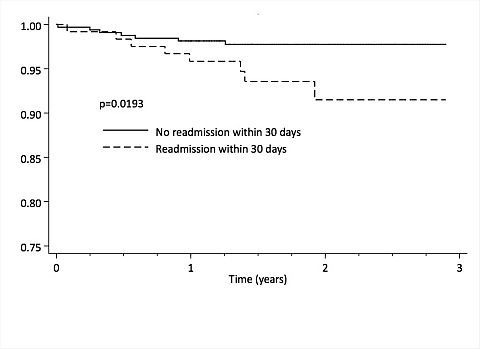Early Hospital Readmissions Following Kidney Transplant Are Associated with Inferior Patient Survival
Medicine, Columbia University Medical Center, New York, NY
Quality and Patient Safety, New York Presbyterian Hospital, New York, NY
Meeting: 2013 American Transplant Congress
Abstract number: D1670
Early hospital readmissions (EHR) are considered an indicator of quality care. EHR are costly and frequent, and have been associated with increased morbidity and mortality for a variety of medical and surgical conditions. Infections and rejections are 2 frequent causes of EHR following kidney transplant (KT), and both complications may be associated with inferior graft survival and graft function. Although ∼16,000 KT are performed annually in the U.S., there are few data on the impact of EHR on patient and graft survival or graft function following KT.
Methods: We performed a retrospective analysis of all adult KT recipients transplanted from 1/1/10-12/31/11 at a single large volume transplant center. All patients received similar immunosuppression (maintenance: tacrolimus and mycophenolate; induction: 4 days of methylprednisolone and thymoglobulin or basiliximab).
Results: 452 patients received a KT during the study period. 123 patients were readmitted (27.2% of total cohort). Mean follow up was 23.3 months. EHR and non-EHR groups were similar with respect to age (53.1 vs. 51.1), % diabetic (36.6 vs. 31.1), % female (39.8 vs. 34.4), % black (18.7 vs. 14.9) and % retransplant (26.0 vs. 20.7). Patients with EHR were more likely to have donor specific antibody (DSA) (23.6% vs. 12.8%). Patient survival was significantly worse in the EHR group.

On multivariable analysis, after adjusting for DSA, donor type, and dialysis at discharge, age and EHR were significantly associated with worse patient survival. There was no difference in overall or death-censored graft survival. Renal function at 1 year was similar in the 2 groups (creatinine 1.5 EHR, 1.4 non-EHR).
Conclusions: EHR following KT are not associated with any impact on short-term allograft survival or function. However, EHR are associated with increased patient mortality following KT, with a reduction in survival that persists and becomes more significant over time. Analysis of risk factors for death following EHR may allow for interventions which could reduce mortality in this group.
To cite this abstract in AMA style:
Dube G, Coppelson Y, Cohen D, Mohan S. Early Hospital Readmissions Following Kidney Transplant Are Associated with Inferior Patient Survival [abstract]. Am J Transplant. 2013; 13 (suppl 5). https://atcmeetingabstracts.com/abstract/early-hospital-readmissions-following-kidney-transplant-are-associated-with-inferior-patient-survival/. Accessed February 19, 2026.« Back to 2013 American Transplant Congress
